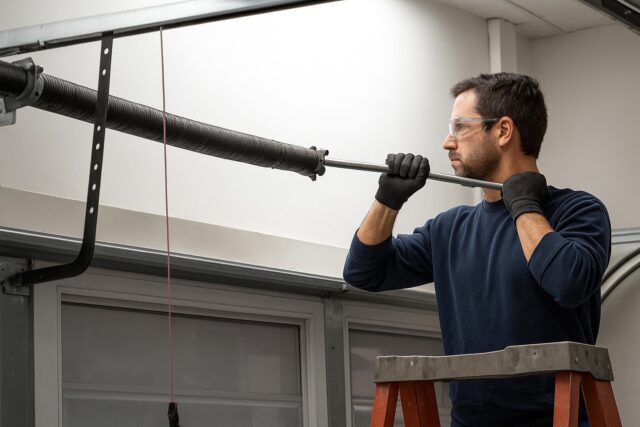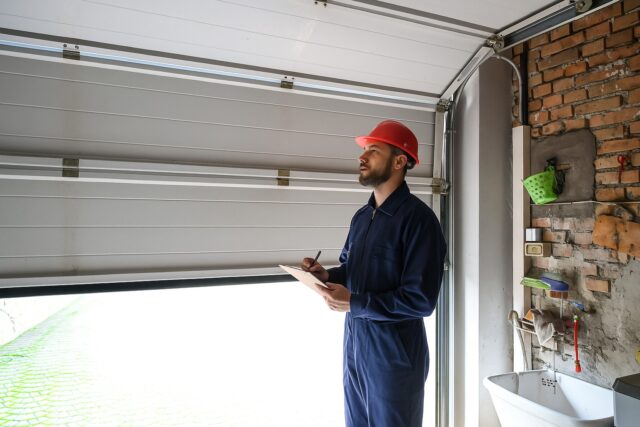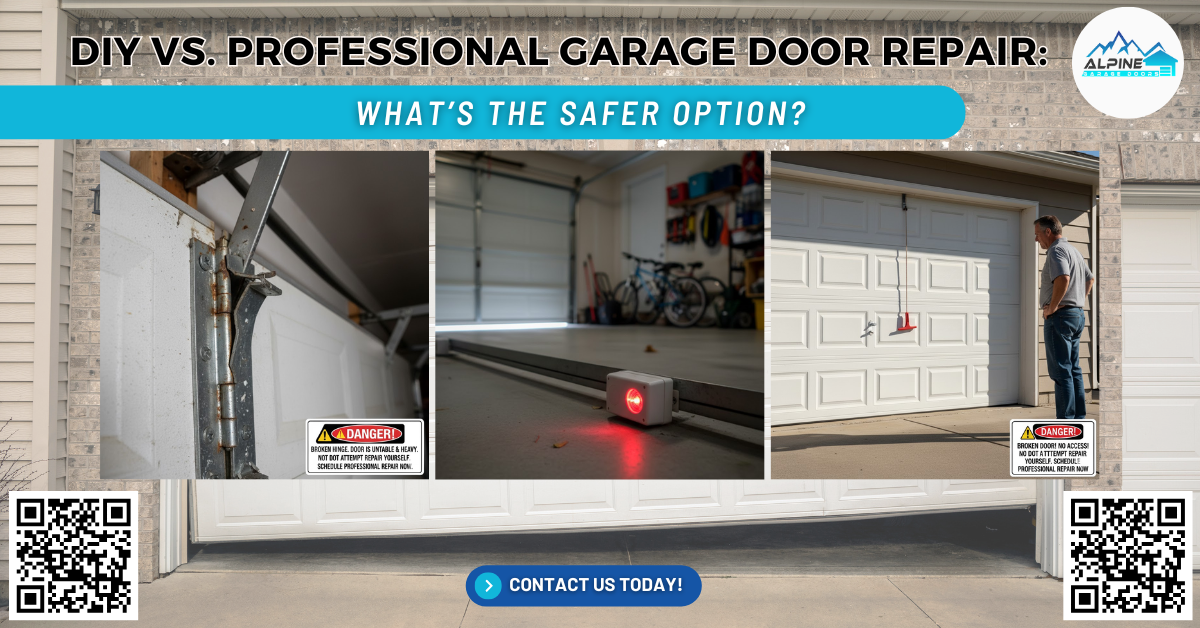Every homeowner will eventually face the need for a garage door repair. It might begin as a simple creaking sound, a door that opens more slowly than usual, or a spring that suddenly snaps one cold morning. The question many people face at that moment is whether to try fixing the problem themselves or to call in a professional. On the surface, it might seem like a straightforward choice, but the safety, cost, and long-term implications are much deeper than most realize.
At Alpine Garage Doors New England, we’ve witnessed countless cases where well-meaning homeowners tried to fix their garage door on their own, only to create bigger, costlier, and sometimes dangerous problems. One memorable case involved a homeowner in Cambridge, Massachusetts, who attempted to replace a broken spring without the proper tools. The spring recoiled unexpectedly and damaged both the door panel and the surrounding wall. Fortunately, he wasn’t hurt—but the incident underscored just how risky garage door systems can be when handled without proper training.
According to the U.S. Consumer Product Safety Commission (CPSC), garage doors account for more than 20,000 injuries annually in the United States. Many of these result from broken springs or mishandled DIY repairs. While garage doors seem simple, they are actually among the most complex moving parts in a home. Understanding how they work and the difference between do-it-yourself fixes and professional service can help homeowners make smarter and safer choices.
Let’s explore the risks, benefits, and real differences between DIY and professional garage door repair, along with expert tips to keep your door running smoothly for years to come.
Understanding the Anatomy of a Garage Door System
Before diving into repairs, it helps to understand what makes a garage door function. A garage door system is a precise balance of mechanical, electrical, and safety components designed to move a heavy door with minimal effort.
Key Components:
- Torsion and Extension Springs: These counterbalance the door’s weight. When the door opens, the springs unwind to assist in lifting; when closing, they store tension to control descent.
- Cables and Pulleys: These work with the springs to ensure an even lifting motion. A frayed or broken cable can cause the door to tilt or jam.
- Tracks and Rollers: These guide the door smoothly along its path. Dirt, misalignment, or rust can disrupt movement and cause grinding noises.
- Garage Door Opener: This motorized device controls door movement and often integrates with remote controls or smart systems.
- Safety Sensors: Installed near the floor, these detect obstacles and prevent the door from closing on objects or people.
- Weather Seals: These protect the garage from water, pests, and drafts, maintaining insulation and comfort inside the home.
When all parts work in harmony, the door glides quietly and safely. But when one part malfunctions, such as a stretched spring or an unresponsive opener, it can throw off the balance of the entire system.
Why DIY Garage Door Repair Appeals to Homeowners
Many homeowners feel confident taking on DIY garage door repair projects because of accessibility and convenience. The internet is full of step-by-step tutorials that make repairs seem straightforward.
Here are the top reasons DIY appeals to many:
- Perceived Savings: Avoiding service fees seems economical upfront.
- Immediate Action: You don’t have to wait for a service appointment.
- Personal Satisfaction: Some enjoy the sense of accomplishment that comes with home improvement projects.
However, what looks easy in a tutorial often involves layers of hidden complexity. Springs, cables, and door alignment require precise calibration, and mistakes can lead to both property damage and personal injury.
The Most Common DIY Garage Door Repair Mistakes (and Their Consequences)
Many homeowners underestimate how small errors can escalate. Here are some common issues we’ve encountered over the years at Alpine Garage Doors New England:
1. Replacing Springs Without Proper Training
Garage door springs are under extreme tension, up to 200 pounds of torque. One slip of a wrench can release this energy violently. Even experienced handymen are caught off guard by the sheer power stored in these coils.

2. Installing Mismatched Parts
Using parts that don’t match your door’s brand or model can affect the door’s balance and operation. A mismatched cable or spring can cause the door to tilt unevenly or damage the opener over time.
3. Overlooking Track Alignment
Tracks guide the door’s vertical and horizontal motion. If the alignment is off by even half an inch, it can cause grinding, bending, or uneven wear on rollers and hinges.
4. Ignoring the Door’s Weight Distribution
Garage doors weigh hundreds of pounds. Lifting or adjusting them manually without proper bracing can lead to back injuries or dropped panels.
5. Misdiagnosing the Problem
Many homeowners assume a malfunctioning opener is at fault when the real issue is a spring or track alignment problem. Without an accurate diagnosis, the fix won’t last, and may make matters worse.
6. Skipping Safety Testing
After any adjustment, safety sensors and auto-reverse systems must be tested. These prevent accidents but can easily be knocked out of alignment during DIY work.
The Hidden Dangers of DIY Garage Door Repair
A garage door may seem harmless until you realize it’s one of the heaviest moving objects in your home. The average residential door can weigh between 130 and 400 pounds, and commercial doors can exceed 600 pounds.
Here are some of the biggest dangers of DIY repair:
- Severe Injury Risk: Springs or cables can snap suddenly, causing lacerations, broken bones, or even more serious harm.
- Electrical Hazards: Garage door openers run on high-voltage wiring. Improper handling can cause shocks or short circuits.
- Structural Damage: A misaligned or dropped door can bend tracks or warp panels, leading to higher repair costs.
- Voided Warranties: Most door and opener manufacturers void warranties if unauthorized repairs are made.
- Increased Long-Term Costs: Improper fixes may temporarily solve one issue but create more expensive problems later.
In short, while you may save a few dollars today, DIY repairs can end up costing far more in the long run.
When DIY Repairs Are Acceptable
Not every garage door issue requires professional intervention. Homeowners can safely perform small maintenance tasks with minimal risk, provided they follow instructions carefully.
Safe DIY Tasks Include:
- Cleaning the tracks and removing debris.
- Lubricating hinges, rollers, and springs using silicone-based lubricant.
- Tightening loose nuts, bolts, and brackets.
- Replace the remote battery or opener light bulb.
- Inspecting and cleaning weather seals to improve insulation.
These actions contribute to smoother operation and longer lifespan but should never extend to spring adjustments, cable replacements, or opener reprogramming involving internal wiring.
Why Professional Garage Door Repair Is the Safer and Smarter Option
When it comes to safety, longevity, and peace of mind, hiring a professional garage door technician is the best choice.
1. Training and Certification
At Alpine Garage Doors New England, our technicians undergo extensive hands-on training covering installation, repair, and safety protocols. They understand the nuances of spring tension, track alignment, and opener calibration, skills that come only with experience.
2. Specialized Tools and Equipment
Professionals use winding bars, precision measuring devices, and manufacturer-approved parts. These tools are not typically available in standard home toolkits.
3. Safety Compliance
Trained technicians follow OSHA and industry safety standards, ensuring both property and people are protected during repair work.
4. Warranty and Service Guarantee
Professional repairs typically include both parts and labor warranty. If an issue recurs, it’s addressed promptly without additional cost to the homeowner.
5. Thorough Inspections
During every service, professionals conduct a multi-point inspection to identify wear, rust, misalignment, or safety risks, helping prevent future breakdowns before they occur.

How Professionals Diagnose Garage Door Problems
When you schedule a garage door repair with Alpine Garage Doors New England, our team begins with a comprehensive diagnostic process. This ensures we don’t just fix symptoms—we identify root causes.
Step-by-Step Diagnostic Approach:
- Visual Assessment: Inspect tracks, rollers, and springs for visible wear or damage.
- Operational Testing: Observe how the door moves, checking for jerky motion or uneven lifting.
- Opener Evaluation: Examine motor function, circuit boards, and remote responsiveness.
- Sensor Calibration: Test the auto-reverse function and ensure sensors are aligned properly.
- Lubrication and Balance Check: Measure spring tension and rebalance the door if necessary.
This methodical approach ensures safe, lasting results.
Real-Life Example: A Tale of Two Repairs
In Hartford, Connecticut, two homeowners experienced similar garage door issues. The first tried a DIY fix after watching online tutorials, replacing one of his torsion springs. Unfortunately, the replacement was mismatched in size, causing the opener to overwork and eventually burn out.
The second homeowner contacted Alpine Garage Doors New England right away. Our technicians replaced both springs as a matched pair, recalibrated tension, and performed a full safety inspection. The repair took less than two hours, cost less overall, and came with a one-year warranty.
The difference? Experience, precision, and the assurance that the job was done right.
Common Garage Door Issues Requiring Professional Attention
- Broken or Stretched Springs: The most frequent repair request. These high-tension components require expert handling.
- Frayed or Snapped Cables: Cables lift the full weight of the door and can cause severe injury if mishandled.
- Faulty Openers: Electrical repairs or motor replacements demand technical skill and safety precautions.
- Off-Track Doors: When a door leaves its track, forcing it can bend metal rails or damage rollers.
- Noisy Operation: Grinding or squeaking often signals deeper alignment or hardware problems.
- Weather Seal Replacement: Ensures energy efficiency and protects your garage from water and pests.
- Panel or Section Damage: Professionals can replace single panels instead of an entire door when caught early.
The Cost of Safety: DIY vs. Professional Repair Comparison
| Task | DIY Approximate Cost | Professional Service | Safety Risk Level |
| Track Lubrication | $20 | $75–$100 | Low |
| Roller Replacement | $50–$100 | $150–$200 | Medium |
| Spring Replacement | $80 (parts only) | $250–$350 | Very High |
| Opener Motor Repair | $50–$80 | $200–$300 | Electrical Risk |
| Cable Replacement | $60–$90 | $180–$250 | High |
As you can see, DIY might save a small amount upfront, but the potential for injury or further damage makes professional repair the smarter investment.
The Long-Term Value of Professional Maintenance
Regular maintenance extends your garage door’s lifespan and helps you avoid sudden breakdowns. Professionals can identify minor wear before it becomes major damage.
Benefits of Scheduled Maintenance:
- Smoother, quieter operation.
- Reduced stress on the opener motor.
- Enhanced safety through regular sensor calibration.
- Improved home security with reliable closure.
- Extended lifespan for rollers, springs, and cables.
Homeowners are encouraged to schedule maintenance at least once per year, ideally before seasonal temperature changes.
The Role of Technology in Modern Garage Door Repair
Today’s garage doors often include smart technology such as Wi-Fi-enabled openers, battery backup systems, and motion-detection sensors. Attempting DIY work on these systems can void warranties and compromise connectivity.
Professional technicians not only repair mechanical issues but also update firmware, integrate smart systems, and ensure compatibility between devices. Whether you’re using MyQ, LiftMaster, or Genie systems, having expert support ensures long-term reliability.
Safety Tips for Homeowners
Even when you rely on professionals, there are simple safety habits every homeowner should follow:
- Test Auto-Reverse Sensors Monthly. Place an object under the closing door; it should reverse immediately.
- Listen for Unusual Sounds. Grinding, rattling, or squeaking noises often indicate worn rollers or misaligned tracks.
- Check Door Balance. Disconnect the opener and lift the door halfway. It should stay in place. If it falls or rises, springs need adjustment.
- Keep Hands Clear of Moving Parts. Never touch cables, springs, or rollers while the door is in motion.
- Unplug During Electrical Storms. Power surges can damage the opener circuit board.
The Importance of Choosing a Trusted Garage Door Company
Not all repair companies are created equal. When selecting a professional service provider, prioritize transparency, reputation, and proven expertise.
Alpine Garage Doors New England stands out because we combine:
- Certified technicians with years of field experience.
- Emergency repair services are available 24/7.
- Transparent pricing with no hidden fees.
- Genuine manufacturer-approved parts.
- Customer-focused service, ensuring every job meets our quality guarantee.
Our team proudly serves Connecticut, Boston, and surrounding New England communities, handling everything from minor adjustments to full-scale commercial installations.
Preventive Measures to Avoid Costly Repairs
Many homeowners are surprised to learn that simple habits can dramatically reduce repair frequency. Here are proactive steps to keep your door in top condition:
- Apply lubricant on rollers and hinges every 3–6 months.
- Keep the weather stripping intact to prevent moisture and rust.
- Inspect springs for signs of corrosion or stretching.
- Ensure the door balance feels neutral when manually lifting.
- Schedule an annual inspection by a certified technician.
These small steps can save hundreds of dollars in future repairs.
Environmental and Energy Benefits of a Well-Maintained Garage Door
An efficient garage door doesn’t just look good—it saves energy. Sealed doors prevent cold drafts in winter and hot air intrusion in summer, improving your home’s HVAC performance.
Professionally maintained insulation and weather seals can reduce energy loss by up to 20%, lowering monthly utility bills. This is especially beneficial for New England homeowners, where seasonal temperature changes are significant.
Frequently Asked Questions (FAQs)
- How often should a garage door be serviced by a professional?
It’s recommended to have your garage door serviced by a professional at least once a year. Regular maintenance helps identify small issues early, prevents costly breakdowns, and ensures smooth, safe operation throughout the seasons. - What are the signs that my garage door springs are wearing out?
Common signs include loud noises during operation, uneven door movement, or a door that feels heavier than usual when opened manually. If you notice any of these, call a professional right away—continuing to use worn springs can be dangerous. - Can I replace just one garage door spring instead of both?
While it’s possible, professionals typically recommend replacing both springs at the same time. This ensures balanced tension and smoother operation, preventing premature wear on the new spring. - What should I do if my garage door won’t open during a power outage?
Most modern garage door openers have a manual release cord, usually red, that disconnects the opener so you can lift the door manually. Always ensure the door is fully closed before re-engaging the opener once power returns.
How Can Alpine Garage Doors New England Help You?
When your garage door stops working as it should, you need a reliable team that understands both the urgency and technical detail of the problem.
At Alpine Garage Doors New England, located at 150 Cross St, Boston, MA 02109, United States, we specialize in residential and commercial garage door repair, installation, and maintenance throughout Connecticut and the greater New England area.
Our expert services include:
- Precision garage door repair for springs, cables, rollers, and openers.
- Professional garage door installation and upgrades for new models.
- Preventive maintenance programs are designed to extend lifespan and efficiency.
- 24/7 emergency repair service for unexpected breakdowns.
Call our team today at (617)-865-7222 to schedule your service or consultation. We pride ourselves on fast response, honest pricing, and unmatched craftsmanship.
Final Thoughts
Choosing between DIY and professional garage door repair isn’t just about cost, it’s about safety, reliability, and long-term peace of mind. While homeowners can perform basic maintenance, complex mechanical or electrical repairs belong in professional hands.
At Alpine Garage Doors New England, we combine years of expertise, advanced tools, and a customer-first approach to deliver results you can trust. Whether your issue involves a broken spring, faulty opener, or door off its track, we’ll handle it with precision and care.
Don’t risk your safety or your investment—call Alpine Garage Doors New England today for dependable, professional, and affordable garage door services throughout Connecticut and beyond.

